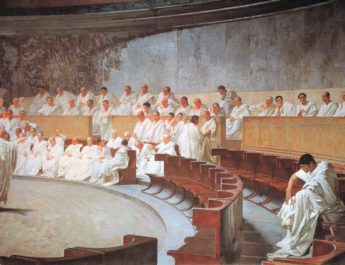1 Corinthians 11:23-26
Maundy Thursday ABC
23 For I receivedA from the LordB what I also handed onC to you,
A “received” = paralambano. From para (beside, by, in the presence of) + lambano (active acceptance/taking of what is available or what has been offered; emphasizes the choice and action of the individual). This is to receive, take, acknowledge, associate with. It can also mean to take on an office or to learn.
B “Lord” = Kurios. From kuros (authority, supremacy). This is a respectful address meaning master or sir. It refers to one who has control or power greater than one’s own. So, it was also applied to God and Jesus as Master or Lord.
C “handed on” = paradidomi. From para (from beside, by) + didomi (give, offer, place, bestow, deliver; give in a literal or figurative sense). This is literally to hand over – hence to deliver, abandon, or betray. It implies a personal involvement.
that the Lord JesusD on the night when he was betrayedE tookF a loaf of bread,G
D “Jesus” = Iesous. From Hebrew Yehoshua (Joshua, the Lord is salvation); {from YHVH (proper name of the God of Israel; the self-existent and eternal one); {from havah (to become) or from hayah (to come to pass, become, be)} + yasha (to deliver, defend, help, preserve, rescue; properly, to be open, wide or free, which implies being safe. So, in a causative sense, this is to free someone)}. This is Jesus or Joshua in Greek – the Lord saves or the Lord is salvation.
E “betrayed” = paradidomi. Same as “handed on” in v23. See note C above.
F “took” = lambano. Related to “received” in v23. See note A above.
G loaf of bread” = artos. Perhaps from airo (raise, take up, lift, remove). This is bread or a loaf. It is a loaf as raised.
24 and when he had given thanks,H he brokeI it and said, “This is my bodyJ that is for you. DoK this in remembranceL of me.”
H “given thanks” = eucharisteo. From eu (good, well, well done, rightly) + charis (grace, kindness, favor, gratitude, thanks; being inclined to or favorable towards – leaning towards someone to share some good or benefit; literal, figurative, or spiritual; grace as abstract concept, manner, or action); {from chairo (to rejoice, be glad; used to say hello; properly, delighting in the grace of God or experiencing God’s favor); from char– (to extend favor, lean towards, be inclined to be favorable towards)}. This is giving thanks, being thankful. It is a recognition that God’s grace is good and actively showing gratitude. It can also be used for saying grace before eating. This is where “eucharist” comes from.
I “broke” = klao. 14x in NT. This is to break, to break in pieces as one breaks bread.
J “body” = soma. Perhaps from sozo (to save, heal, rescue); from sos (safe, well, rescued). This is body or flesh. It can be body in a literal or figurative sense (as the body of Christ). This is where the word “somatic” comes from.
K “do” = poieo. This is to make, do, act, construct, abide, or cause.
L “remembrance” = anamnesis. 4x in NT. From anamimnesko (to remind, admonish; to follow the path of memory); {from ana (up, again, among, anew) + mimnesko (to remind or remember; memory through an active, intentional process or being mindful; not incidentally or accidentally remembering); {from mnaomai (to remember; by implication give reward or consequence); perhaps from meno (to stay, abide, wait, endure)}}. This is intentional remembering to re-experience the effect of the event. It is active, motivated as a memorial.
25 In the same way he took the cupM also, after supper,N saying, “This cup is the newO
M “cup” = poterion. From pino (to drink literally or figuratively). This is a drinking vessel. Figuratively, it can refer to one’s lot, to fate, or to what God has in store for you.
N “supper” = deipneo. 4x in NT. From deipnon (a dinner or a feast – a meal in the afternoon or, more commonly, the evening); from the same as dapane (cost or expense); from dapto (to devour). This is to eat the main, evening meal.
O “new” = kainos. This is not new as in new versus old. This is new in the sense of novel, innovative, or fresh.
covenantP in my blood.Q Do this, as often as you drinkR it, in remembrance of me.”
P “covenant” = diatheke. From diatithemi (to place separately – to make a will or covenant; this is arranging ahead of time how things will be accomplished); {from dia (through, because of, across, thoroughly) + tithemi (to put, place, set, fix, establish in a literal or figurative sense; properly, this is placing something in a passive or horizontal position)}. This is a will, covenant, contract, or agreement.
Q “blood” = haima. This is blood in a literal sense as bloodshed. Figuratively, it can also be used to refer to wine or to kinship (being related).
R “drink” = pino. Related to “cup” in v25. See note M above.
26 For as often as you eatS this bread and drink the cup, you proclaimT the Lord’s deathU until he comes.V
S “eat” = esthio. This is to eat or figuratively to devour or consume like rust.
T “proclaim” = kataggello. 18x in NT. From kata (down, against, according to, throughout, among, daily) + aggello (to announce, report) {from aggelos (angel, messenger – supernatural or human envoy of God); probably from ago (lead, bring, drive, carry, guide, go)}. This is to proclaim openly and confidently a very specific message. It can also be celebrate, preach, or teach.
U “death” = thanatos. From thnesko (to die, be dead). This is death, whether literal or spiritual. It can also refer to something that is fatal.
V “comes” = erchomai. This is to come or go.
Image credit: “Last Supper” by Albert Szukalski, 1984. Photo by LucynaPrz, 2019.




